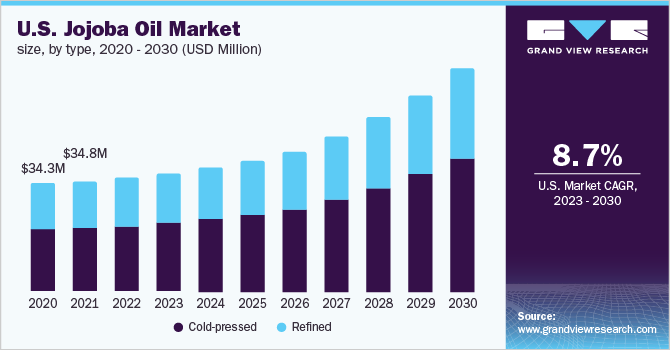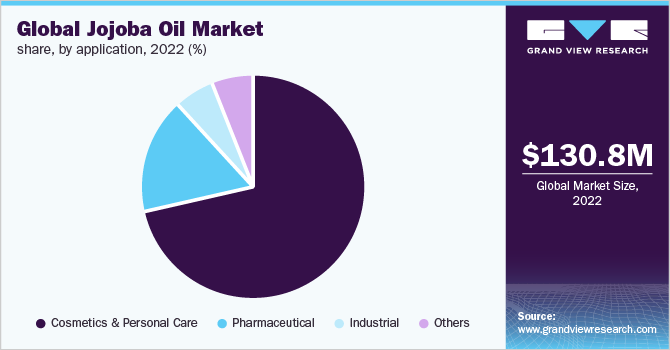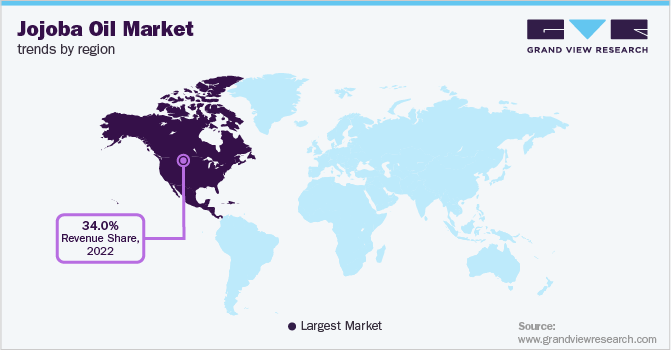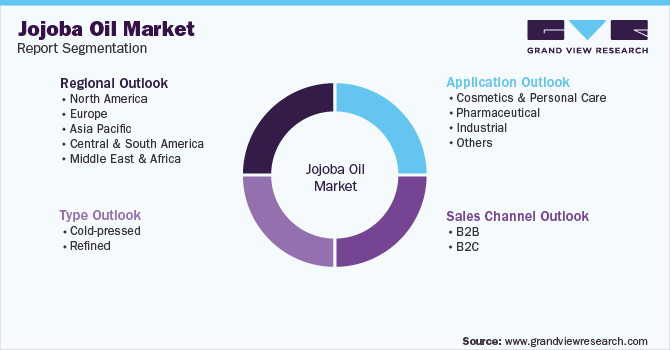- Home
- »
- Personal Care & Cosmetics
- »
-
Global Jojoba Oil Market Size, Share & Growth Report, 2030GVR Report cover
![Jojoba Oil Market Size, Share & Trends Report]()
Jojoba Oil Market (2023 - 2030) Size, Share & Trends Analysis Report By Type, By Application (Cosmetics & Personal Care, Pharmaceutical), By Sales Channel (B2B, B2C), By Region, And Segment Forecasts
- Report ID: GVR-1-68038-016-3
- Number of Report Pages: 125
- Format: PDF
- Historical Range: 2018 - 2021
- Forecast Period: 2023 - 2030
- Industry: Bulk Chemicals
- Report Summary
- Table of Contents
- Interactive Charts
- Methodology
- Download FREE Sample
-
Download Sample Report
Jojoba Oil Market Summary
The global jojoba oil market size was estimated at USD 130.8 million in 2022 and is projected to reach USD 236.6 million by 2030, growing at a CAGR of 7.7% from 2023 to 2030. This is attributable to the growing inclusion of the product in cosmetics & personal care formulations.
Key Market Trends & Insights
- The North America dominated the market with the highest revenue share of 34.0% in 2022.
- The U.S. jojoba oil industry is developing and gaining importance on account of the inclusion of high-performance ingredients such as omega 3, triterpenoids, and tocopherols.
- Based on type, the cold-pressed type dominated the market with the highest revenue share of 63.5% in 2022.
- Based on sales channel, the B2B channel dominated the global market with the highest revenue share of 62.4% in 2022.
- Based on application, the cosmetics & personal care application dominated the jojoba oil market with the highest revenue share of 71.5% in 2022.
Market Size & Forecast
- 2022 Market Size: USD 130.8 Million
- 2030 Projected Market Size: USD 236.6 Million
- CAGR (2023-2030): 7.7%
- North America: Largest market in 2022
Jojoba oil is widely utilized across numerous end-use industries, including cosmetics & personal care, spa & relaxation, and medical as a substitute raw material for conventional products. Jojoba oil is primarily used in several hair care, skin care, eye care, and makeup products owing to its moisturizing, antioxidant, and anti-bacterial properties.
In addition, the oil assists in the treatment of dermatitis, acne, and stretch marks. It can also be used as a body care product to improve the health of hair and nails, thereby increasing its appeal among women and female teenage consumers.
The rising disposable income of consumers and the high population of working women in the U.S. are expected to be major drivers for this industry. Increasing awareness regarding feminine hygiene and health has also promoted the adoption of natural products and cosmetics. Mature markets such as the U.S. and the U.K. have witnessed a significant demand for natural personal care products. Major brands such as Melvita, Annemarie Borlind, JĀSÖN, and Avalon Organics are increasing the content of natural ingredients in their products.
Jojoba oil is a developing market and gaining importance on account of its high-performance ingredients, such as vitamins & nutrients, which include fatty acids such as omega 6 & omega 3, tocopherols, and beta amyrine. They help in accelerating cell growth and strengthen its antiseptic & anti-inflammatory properties. As a result, it is gaining increasing importance in cosmetics & personal care products.
Skin and hair care product manufacturers that use the oil for developing advanced cosmetic solutions generate the maximum product demand. These products are marketed under the premium products category. Furthermore, consumer inclination and readiness to pay a high price for premium products along with the growing preference toward natural and organic products have augmented the demand for jojoba oil in the cosmetic and personal care industries.
Type Insights
The cold-pressed type dominated the market with the highest revenue share of 63.5% in 2022. The growth can be attributed to the high demand for naturally sourced, pure, chemical-free, and high-quality products from various end-use industries including personal care, cosmetics, and pharmaceutical among others. The cold-pressed segment has witnessed an upsurge in demand as compared to refined jojoba oil owing to growing consumer inclination toward chemical-free and naturally sourced products.
Refined jojoba oils initially go through the same process as cold-pressed oils but are further processed using solvent extraction, bleaching, and deodorization to remove impurities, undesirable colors, and scents. These oils are stable owing to their high-temperature processing. They are cheaper and possess a longer shelf life as well as are odor-free than cold-pressed oils.
Owing to the abovementioned properties, refined jojoba oil is preferred over cold-pressed oil for manufacturing, which requires high stability and longer shelf life. This is expected to positively impact the segment growth over the forecast period. However, high-temperature processing results in the reduced nutritional value of jojoba oil, which is expected to pose a threat to its demand.
As harmful chemical solvents are not used in the cold-pressing method to extract the oil, there is less risk to the environment and the health of the consumer. Additionally, processing jojoba oil at a controlled temperature (no higher than 49 degrees) helps it maintain its natural qualities, such as flavor, smell, and nutritional value. However, several characteristics of cold-pressed oil, including a shorter shelf life than that of refined jojoba oil, a potent aroma, and a longer extraction period, are expected to pose a significant challenge to the market's expansion.
Sales Channel Insights
The B2B channel dominated the global market with the highest revenue share of 62.4% in 2022. From the standpoint of sales, B2B marketing helps the participants build a platform for connections with businesses that can use the company's goods or services. Due to the difficulty and effort involved in identifying leads, lead generation can be very challenging. Consequently, it is advised to use lead lists provided by reputable third-party providers.
The need of developing an online sales strategy for B2B vendors is rising as jojoba oil sales online reach historic highs. The core of all online sales and marketing efforts is a user-friendly website. It is beneficial to incorporate email advertising, search engine optimization, social networking, and related initiatives into the company's sales strategies and marketing mix.
Although it is necessary to develop a precise sales force with well-qualified sales personnel, it is equally important to equip them with strong messaging and effective marketing channels. This helps in improving the conversion rate. Essential oils businesses are busy operations with little patience for long sales cycles. A well-defined marketing plan establishes a systematic communication link with marketing channels having a good hang of the customer base backed by direct interaction. A marketing plan coupled with a sales strategy has often proven to provide strategic advantages to market participants.
Jojoba oil can be purchased through retail outlets, online retailers, and private-label producers. Jojoba oil is becoming more and more popular as a carrier for other essential oils, which has increased sales through online marketplaces. Consumption of jojoba oil is being driven by rising consumer awareness, particularly among working-class women, due to demand regarding aesthetic concerns and skin health, which is leading to an increase in direct purchases made through retail and online sales.
Application Insight
Cosmetics & personal care application dominated the jojoba oil market with the highest revenue share of 71.5% in 2022. Its high share is attributable to the rising demand for naturally and organically sourced products. The regular use of jojoba oil-infused hair care products reduces hair fall and imparts thickness as well as improves hair texture and quality. In addition, it helps in treating dry, itchy scalps and split ends. The product is also used in cosmetic formulations such as lipsticks, makeup removers, lip balms, and nail polish.
The product is used as an active pharmaceutical ingredient (API) in topical formulations such as ointments and creams. Jojoba oil-infused products help treat irritated, swollen, itchy, or inflamed skin. The product is highly effective against psoriasis owing to its anti-bacterial property. In addition, it is used for treating hemorrhoids, which are caused by straining during bowel movements, obesity, or pregnancy.

Jojoba oil-infused products help prevent fungal growth and urinary tract infections in females. In infants, the product is used for treating body rashes owing to its anti-inflammatory and soothing properties. The oil is also used as a suitable carrier or coating material in several medicinal preparations as well as a growth inhibitor for several bacterial agents including tubercle bacilli, which causes tuberculosis, and a stabilizer for penicillin products.
Jojoba oil is gaining popularity in the development of various industrial products such as lubricants, paints, and chemicals. It is primarily used as an additive for improving viscosity in lubricants. Jojoba oil and its derivatives, owing to its natural origination, are gaining widespread popularity as an antifoaming agent in detergent & surfactant manufacturing. Furthermore, jojoba oil can effectively act as a coolant in airplane engines and prevent the formation and deposition of ice on airplane wings.
Regional Insights
North America dominated the market with the highest revenue share of 34.0% in 2022. This is attributed to growth in end-use industries such as cosmetics, personal care, and pharmaceutical. The region is home to some of the major cosmetics markets including the U.S., Canada, and Mexico. The U.S. jojoba oil industry is developing and gaining importance on account of the inclusion of high-performance ingredients such as omega 3, triterpenoids, and tocopherols. These ingredients help accelerate cell growth and strengthen the anti-inflammatory & antiseptic features of the human body.
In the U.S., a favorable regulatory scenario along with technology innovation aiming for chemical and microbiology quality enhancement is expected to contribute to the overall market growth. For example, according to the FDA (Food and Drug Administration), the product can be utilized to restore hair growth, reduce cellulite, for cell regeneration, and treat varicose.

Asia Pacific is also home to some of the major cosmetics and personal care markets including South Korea, Japan, India, and China. The Korean skincare and cosmetics industry is developed, highly fragmented, and faces intense competition, with brands constantly investing in R&D activities to develop new products. Beauty is an important aspect of South Korean culture; hence consumers exhibit high knowledge regarding cosmetics products and have very high standards for the same. Therefore, cosmetics companies are under pressure to develop innovative and high-quality products.
Europe has been majorly involved in biopharmaceutical research in recent years. For instance, over the past decade, pharmaceutical companies in the region have successfully manufactured bio-based medicines for several diseases such as cancer, high blood pressure, diabetes, and cardiovascular disease. Moreover, the European legislation regarding the sale of jojoba oil provides a positive outlook for the regional product demand. It is covered under the Novel Food Regulations because of its fairly low toxic content, hence can be imported without any restriction in the European market. This is expected to propel the product demand from the pharmaceutical sector in the region.
Key Companies & Market Share Insights
Prominent players in the market are entering into long-term contracts with globally operating distributors and suppliers to strengthen their distribution network as well as expand their product spread. Companies are also investing in R&D activities and innovation centers to gain a competitive edge in the market. Some prominent players in the global jojoba oil market include:
-
Purcell Jojoba
-
Inca Oil SA
-
Ecooil
-
ConnOils LLC
-
Jojoba Naturals
-
JD Jojoba Desert
-
Hallstar
-
Nutrix International LLC
-
US Organic Group Corp
-
OPW Ingredients GmbH
Jojoba Oil Market Report Scope
Report Attribute
Details
Market size value in 2023
USD 135.2 million
Revenue forecast in 2030
USD 236.6 million
Growth Rate
CAGR of 7.7% from 2023 to 2030
Base year for estimation
2022
Historical data
2018 - 2021
Forecast period
2023 - 2030
Quantitative units
Revenue in USD million, volume in tons, CAGR from 2023 to 2030
Report coverage
Revenue forecast, company ranking, competitive landscape, growth factors, trends
Segments covered
Type, application, sales channel, region
Regional scope
North America; Europe; Asia Pacific; Central & South America; Middle East & Africa
Country scope
U.S.; Canada; Mexico; Germany; U.K.; France; Spain; Italy; China; India; Japan; South Korea; Thailand; Australia; Brazil; Argentina; Saudi Arabia; South Africa
Key companies profiled
Purcell Jojoba; Inca Oil SA, Ecooil; ConnOils LLC; Jojoba Naturals; JD Jojoba Desert; Hallstar; Nutrix International LLC; US Organic Group Corp; OPW Ingredients GmbH
Customization scope
Free report customization (equivalent up to 8 analysts working days) with purchase. Addition or alteration to country, regional & segment scope.
Pricing and purchase options
Avail customized purchase options to meet your exact research needs. Explore purchase options
Global Jojoba Oil Market Segmentation
This report forecasts revenue growth at global, regional, and country levels and provides an analysis of the latest industry trends in each of the sub-segments from 2018 to 2030. For this study, Grand View Research has segmented the global jojoba oilmarket report based on type, application, sales channel, and region:

-
Type Outlook (Volume, Tons; Revenue, USD Million, 2018 - 2030)
-
Cold-pressed
-
Refined
-
-
Application Outlook (Volume, Tons; Revenue, USD Million, 2018 - 2030)
-
Cosmetics & Personal Care
-
Pharmaceutical
-
Industrial
-
Others
-
-
Sales Channel Outlook (Volume, Tons; Revenue, USD Million, 2018 - 2030)
-
B2B
-
B2C
-
-
Regional Outlook (Volume, Tons; Revenue, USD Million, 2018 - 2030)
-
North America
-
U.S.
-
Canada
-
Mexico
-
-
Europe
-
Germany
-
France
-
U.K.
-
Italy
-
Spain
-
-
Asia Pacific
-
China
-
India
-
Japan
-
South Korea
-
Thailand
-
Australia
-
-
Central & South America
-
Brazil
-
Argentina
-
-
Middle East & Africa
-
Saudi Arabia
-
South Africa
-
-
Frequently Asked Questions About This Report
b. The global jojoba oil market size was estimated at USD 130.8 million in 2022 and is expected to reach USD 135.2 million in 2023.
b. The global jojoba oil market is expected to grow at a compound annual growth rate of 7.7% from 2023 to 2030 to reach USD 236.6 million by 2030.
b. North America dominated the jojoba oil market with a share of over 34% in 2022. This is attributable to rising demand from cosmetics, personal care, and pharmaceutical industries in the region.
b. Some key players operating in the jojoba oil market include Jojoba Naturals, JD Jojoba Desert, Ecooil, Inca Oil SA, and Purcell Jojoba.
b. Key factors that are driving the jojoba oil market growth include increasing consumer inclination towards chemical-free, natural, and organic products.
Share this report with your colleague or friend.
Need a Tailored Report?
Customize this report to your needs — add regions, segments, or data points, with 20% free customization.

ISO 9001:2015 & 27001:2022 Certified
We are GDPR and CCPA compliant! Your transaction & personal information is safe and secure. For more details, please read our privacy policy.
Trusted market insights - try a free sample
See how our reports are structured and why industry leaders rely on Grand View Research. Get a free sample or ask us to tailor this report to your needs.










